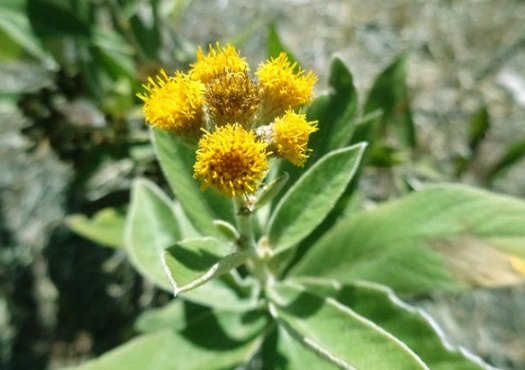Nikhil Prasad Fact checked by:Thailand Medical News Team Feb 24, 2025 1 month, 3 weeks, 3 days, 13 hours, 56 minutes ago
Medical News: A Traditional Herb with Modern Scientific Validation
Inula cappa, a plant long used in traditional medicine, is gaining recognition in modern research for its potent anti-inflammatory properties. Scientists from Hebei University in China have been investigating the mechanisms behind its medicinal effects, revealing promising results that could pave the way for new treatments for inflammatory diseases. This
Medical News report explores the findings of recent studies that highlight the bioactive compounds in Inula cappa and their impact on inflammation-related conditions.
 New Insights on the Anti-Inflammatory Potential of The Herbal Plant Inula Cappa
New Insights on the Anti-Inflammatory Potential of The Herbal Plant Inula Cappa
Inflammation is a natural immune response to infection or injury, but excessive or chronic inflammation can lead to serious health issues, including arthritis, bronchitis, and even neurodegenerative diseases. While pharmaceutical anti-inflammatory drugs are widely used, they often come with side effects. Researchers have been exploring plant-based alternatives, and Inula cappa has emerged as a powerful candidate. The study focused on identifying the active components of the herb and how they interact with the body's inflammatory pathways.
Key Bioactive Compounds Identified
Through extensive laboratory research, scientists identified several key compounds in Inula cappa that contribute to its anti-inflammatory effects. These include sesquiterpenes, inositols, flavonoids, and caffeoylquinic acids. Among them, specific compounds such as luteolin, artemetin, chrysoerilol, and various forms of chlorogenic acid demonstrated significant inhibition of inflammation-related markers.
The study found that these compounds work by modulating multiple inflammatory signaling pathways. For example, they effectively regulate cytokines such as tumor necrosis factor-alpha (TNF-α), interleukin-6 (IL-6), and interleukin-1 beta (IL-1β), which play a critical role in the body's immune response. By reducing these cytokines, the plant compounds help control excessive inflammatory reactions.
Inhibiting Key Inflammatory Pathways
One of the most significant discoveries was the herb's impact on the Toll-like receptor 2 (TLR2) and nuclear factor-kappa B (NF-κB) pathways. These pathways are crucial in the regulation of immune responses and inflammation. The study showed that compounds extracted from Inula cappa can inhibit the activation of these pathways, thereby preventing the overproduction of inflammatory mediators. This finding suggests that the herb could be particularly useful in conditions such as rheumatoid arthritis, inflammatory bowel disease, and other chronic inflammatory disorders.
Additionally, the research highlighted the plant's role in regulating the mitogen-activated protein kinase (MAPK) pathway, which is another essential mechanism in inflammatory responses. By targeting this pathway, the active compounds in Inula cappa can reduce inflammation at the cellular level, providing a potential alternative to conventional anti-infl
ammatory drugs.
Promising Implications for Future Treatments
The findings of this research have significant implications for the development of natural anti-inflammatory therapies. Unlike synthetic drugs that often cause gastrointestinal issues or immune suppression, plant-based compounds like those found in Inula cappa offer a safer alternative with fewer side effects. This opens new possibilities for using the herb in complementary and integrative medicine approaches.
However, while these results are promising, further clinical studies are needed to confirm the herb's efficacy in human populations. Future research will focus on optimizing extraction methods, determining proper dosages, and exploring possible synergistic effects with other natural compounds.
Conclusion
The study on Inula cappa provides compelling evidence of its anti-inflammatory potential. By targeting key inflammatory pathways and reducing cytokine activity, the herb shows promise as a natural remedy for inflammatory diseases. The identification of active compounds such as flavonoids and caffeoylquinic acids offers a strong foundation for future drug development. As research progresses, Inula cappa could become a vital component in alternative medicine, providing a safer and effective means to combat inflammation.
The study findings were published in the peer-reviewed International Journal of Molecular Sciences.
https://www.mdpi.com/1422-0067/26/5/1911
For the latest on Herbs and Phytochemicals, keep on logging to Thailand
Medical News.
Read Also:
https://www.thailandmedical.news/news/thymus-vulgaris-extracts-show-strong-potential-as-natural-anti-inflammatory-agents
https://www.thailandmedical.news/news/new-insights-into-how-sglt2-inhibitors-help-reduce-inflammation-in-the-body
https://www.thailandmedical.news/news/lemon-balm-extract-shows-promise-in-reducing-brain-inflammation-from-high-blood-sugar
https://www.thailandmedical.news/articles/herbs-and-phytochemicals
https://www.thailandmedical.news/pages/thailand_doctors_listings
